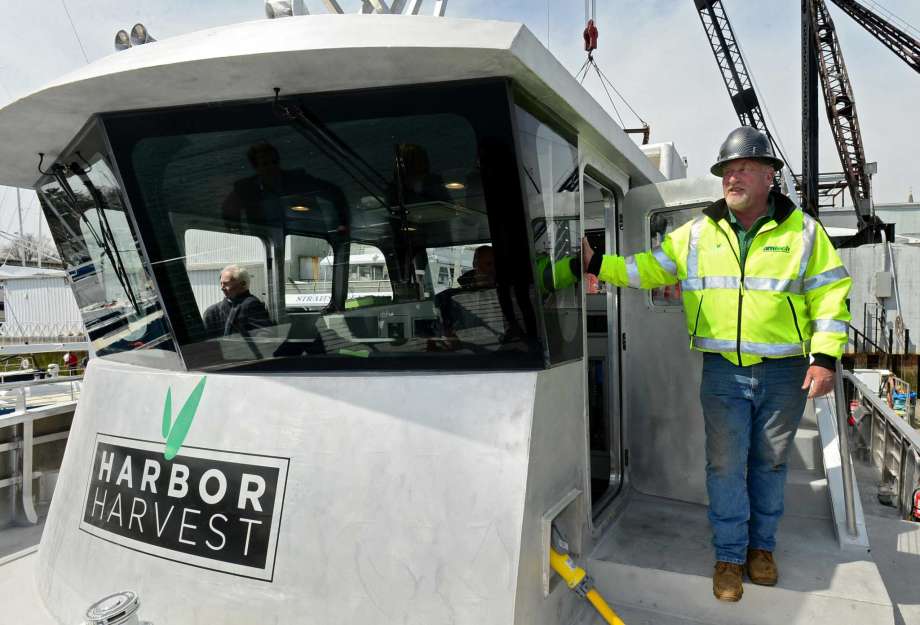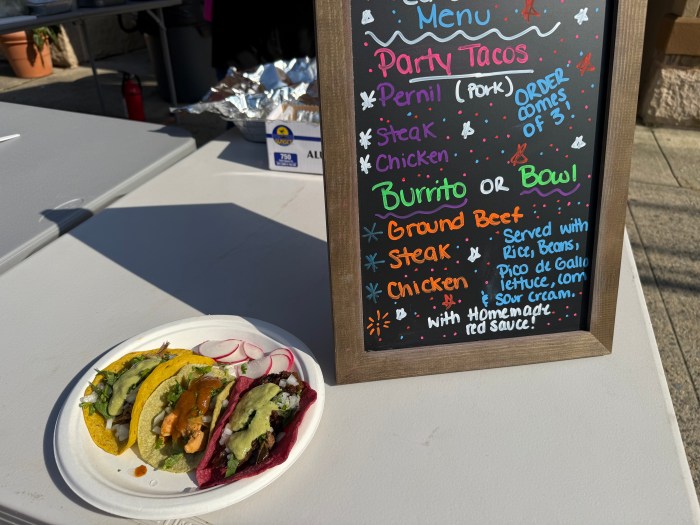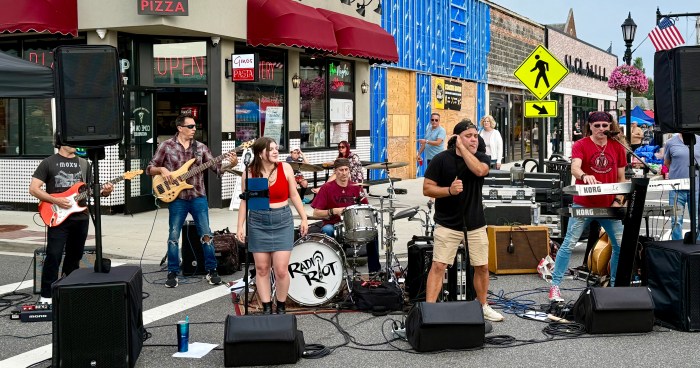The Captain Ben Moore, one of the nation’s first hybrid cargo boats, is sailing the deep blue sea, or at least the Long Island Sound version of it, transporting farm produce between Huntington and Norwalk, Conn., in what may be the start of a new era in the way America delivers goods.
The 65-foot catamaran hybrid’s debut is a 10-year-old dream come true for Norwalk native Robert Kunkel, a former U.S. Navy lieutenant and Merchant Mariner who wanted to use the local waterways much the way people did over a century ago, before the construction of massive interstate highways, when trucking became king.
His Long Island Sound ferry service, Harbor Harvest, is named for an artisanal grocery and café in Norwalk he has run with his wife, Marilyn Kunkel, since 2015. The catamaran is named after a sailor who years ago became Kunkel’s mentor.
“This is all about removing freight congestion from the highways and moving them to the waterways,” Kunkel says. “We had moved freight on the waterways for centuries in this country.”
Harbor Harvest seeks to be an eco-friendly farm-to-fork distribution network. Kunkel said the key to his ferry service is to transport farm produce, and even some small packages, across the Sound in about 45 minutes, compared to several hours by trucks traveling the Long Island Expressway and I-95. Kunkel said his service will not only be faster, but cheaper and more environmentally friendly than trucking.
“The country became enamored with the trucking industry,” says Kunkel, a marine engineer. That began, he noted, once President Dwight Eisenhower instituted the Federal Highway Act in 1956, calling for the construction of 41,000 miles of an interstate highway system, then the largest public works project in American history.
Three years ago, Kunkel and Derecktor Shipyards of Mamaroneck, in Westchester County, one of the last of the famous New York shipbuilders, developed the hybrid boat, which runs on an electric battery system. The boat has 300 square feet of open cargo space, 100 square feet of indoor covered cargo space and 140 square feet of walk-in refrigerated space.
Kunkel said several Long Island and Connecticut produce companies and wineries have expressed interest in signing on with his ferry service.
In a recent major boost, Harbor Harvest was awarded a $1.8 million grant from the U.S. Department of Transportation’s Maritime Administration, which will help defray the cost of building a second boat, which is now in the planning stages. The money is also to be used to build docking space in Huntington.
“The goal…is to provide a viable source of waterborne transportation for Connecticut and Long Island farmers and manufacturers by connecting neighboring communities, in addition to creating produce markets in both Connecticut and New York,” the Maritime Administration said in announcing the grant in March.
The ferry service has already won high praise from environmentalists.
“We think this is an absolutely wonderful idea,” says Adrienne Esposito, executive director of the Citizens Campaign for the Environment. “The farm-to-table movement is growing across the country, and this service is coming along at just the right time.”
Kendra Hems, president of the 600-member Trucking Association of New York, says her organization supports efforts to help eliminate congestion on the roads.
“The projection for the growth of freight is astronomical,” Hems says. “We expect that there will be shifts in the manner in which goods are shipped. We’re not opposed” to shipping by water. But, she said, “There will always be a need for trucks.”
The future of waterway shipping could be very bright indeed.
The New York City Economic Development Corporation (NYCEDC) has issued a request for proposals to companies or individuals interested in opening a new marine terminal in the South Bronx to serve businesses on the Hunts Point Peninsula, in hopes of providing an alternative to trucking to move food and other products.
“We understand that highway congestion is chronic in New York,” says Andrew Genn, senior vice president of ports and terminals for the NYCEDC. “We certainly don’t want to end all trucking, but to make the system more resilient. The cross-Sound project is a good idea.”
For his part, Kunkel is happy to be sailing the Sound.
“I’ve been working on this a long time,” he says. “We’re going to open new markets here.”




































